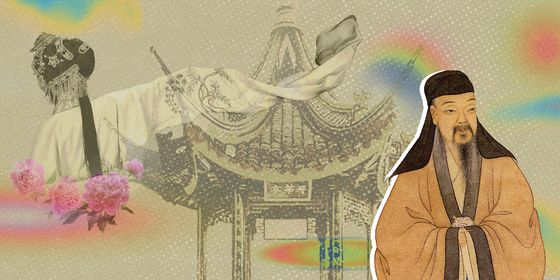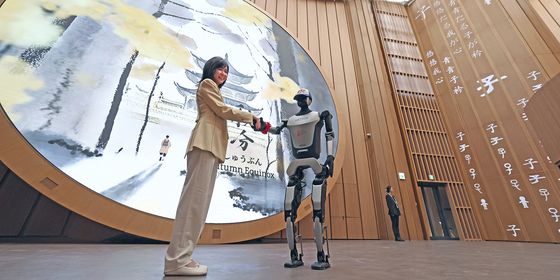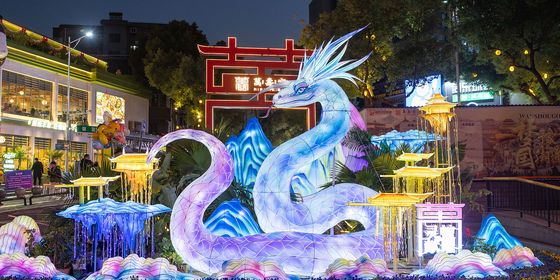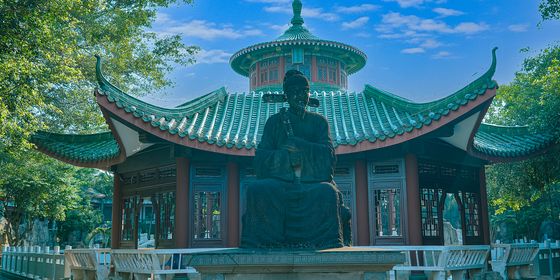In honor of the leadership transition in Washington, a countdown of rulers so bad that they ended eras
What does it take to end an empire? At what point do incompetence and corruption reach a critical mass in which the center cannot hold and the walls come crumbling down? As an American voter, I’ve been asking myself some variation of this question ever since November.
In China, the “bad last emperor” is a bit of cliché. The hackneyed revolutions of the dynastic cycle eventually turn from the heroic founder to the dunderheaded descendant who undoes all the founder’s good work. So, in honor of the leadership transition in Washington, a countdown of the worst of the last: Bad Emperors who ended an era.
5. Sun Hao (242-284)
Eastern Wu [264-280]
The Eastern Wu isn’t one of your marquee dynasties, but it was one-third of the Three Kingdoms and gave its name to the dialect that the Shanghainese shove in the face of every visitor to their city before passive-aggressively switching to Mandarin.
Sun Hao was the grandson of the dynasty’s founder, Sun Quan, and succeeded his uncle, the Emperor Jing, in 264 as a consensus choice to run the dynasty in the face of grave threats from Wu’s enemies. At first, Sun Hao fulfilled his promise to “Make Wu Great Again” by reducing taxes and increasing grain payment to the destitute.
But Sun Hao was also paranoid and superstitious. He forced his aunt, the wife of the former emperor, to commit suicide and then executed most of his cousins. He became obsessed with conquering the State of Jin, the successor state to Wu’s old Three Kingdom’s nemesis, the Wei Dynasty once ruled by the General Cao Cao. The Wu military became dangerously overextended and the costs of Sun Hao’s wars led to rebellions. Eventually, the Jin State turned the tables and conquered Wu in 280 CE, a disaster which did not work out so badly for Sun Hao. The Jin Emperor Sima Yan didn’t share his counterpart’s taste for torture and instead pardoned his vanquished foe. Sun Hao lived another four years as a “guest” of the Jin government at their capital in Luoyang but the Wu were no more.
4. Emperor Duzong (1240-1274)
Song Empire (960-1279)
Duzong was the Charlie Sheen of emperors, spending most of his time drinking and hooking up with a staggering number and variety of women. In ordinary times, delegating authority to your court officials while turning your palace into an oversized frat house might have worked as a lifestyle choice but Duzong did not live in ordinary times. The Mongols were in ascendancy and were committed to conquering the territories of the Song. In 1274, the armies of Kublai Khan captured the key stronghold of Xiangyang clearing the way for a land and sea invasion of the Southern Song heartland. Emperor Duzong died soon after that. He wasn’t the last emperor of the Song, three of his sons, none of whom older than nine when they ascended the throne, would succeed him in turn, but Duzong was the last emperor to rule on his own as an adult. The Song Dynasty would end five years later off the coast of Guangzhou when the Prime Minister Liu Xiufu jumped into the sea with Duzong’s son, six-year-old Zhao Bing, in his arms during the Battle of Yamen.
3. Di Xin (1075-1046 BCE)
Shang Kingdom (c. 1600-1046 BCE)
Public displays of imaginative and vigorous group sex. Lakes of Wine. Seductive women who may or may not be evil fox spirits. The court of Di Xin had it all. The Han-era historian Sima Qian described this emperor as one of the most wicked tyrants in history. Considering the fact that Sima was castrated by his own emperor, that’s a big call. Di Xin’s wife Daji is equally vilified in history and fiction as a demonic entity who enjoyed watching her enemies tied to white-hot metal pillars. In true Chinese historiographic form, it’s Daji that comes in for much of the blame for turning Di Xin into a tyrant, but any dude who designs a bar where you can paddle a canoe through a lake of wine while taxing his people into starvation isn’t going to be winning any awards for “Ruler of the Year.” Ultimately, his kingdom was taken away from him — fickle Heaven and that pesky Mandate again — when the armies of the Zhou conquered his kingdom. Rather than face his enemies, Di Xin instead lit his palace on fire and committed suicide in 1046 BCE.
2. Sui Yangdi (569-618)
Sui Empire [581-618]
The Sui only had two emperors, so the dynastic cycle gets a little accelerated here. You’re either going to be the first or the last. The founding emperor, Sui Wendi (541-604), was as energetic a ruler as China has ever seen. He unified the central plains after nearly three centuries of division and then pushed the boundaries of his empire outward in a series of campaigns which his son, Sui Yangdi would continue to the point of obsession.
Yangdi followed up an invasion of Vietnam in 602 with a series of ill-conceived attempts to conquer the Goguryeo Kingdom on the Korean peninsula which ultimately bankrupted the country. Yangdi paid for his wars with increased taxes and conscription and this led to civil unrest throughout the empire. In true last emperor form, he was also a little overly fond of the ladies. His palace was reported to have dozens of chambers, each occupied by a beautiful consort for the emperor’s pleasure and convenience. Sui Yangdi was killed in a military coup in 618. While he was a terrible ruler, Sui Yangdi stays out of the top spot because he built the Grand Canal and the Sui, short-lived as it was, built a foundation for their much more successful Tang Empire.
Before unveiling number one, a few also-rans. The Chongzhen Emperor (1611-1644) presided over the end of the Ming, but while he wasn’t a great ruler, he was saddled with cleaning up the messes left by his predecessor, the Tianqi Emperor (1605-1627). The Tianqi Emperor was functionally illiterate and spent much his time playing carpenter while the eunuchs — including the notorious Wei Zhongxian — ran the empire into the ground. Qin Er Shi (229-207 BCE), the son of Qin Shihuangdi, was a shadow of his father. He lived surrounded by sycophants and was unable to quell the rebellions tearing apart the Qin Empire (221-206 BCE).
There was Hudun (d. 1234), a Jurchen general who served as ruler of the Jurchen Jin Dynasty (1115-1234) for only a few hours. He was deputized by the Emperor Aizong as Mongol forces crashed through the walls of the final Jin redoubt at Caizhou. Aizong then committed suicide leaving Hudun in charge for the amount of time it took the Mongol soldiers to find Hudun and kill him, thus ending the Jin Dynasty and leaving Hudun the dubious distinction as having the shortest reign as emperor in Chinese history.
1. King Jie (1728-1675 BCE
Xia Kingdom (c. 2700 – c. 1600 BCE).
When your name is synonymous with “Bad Last Emperor” you get the top spot. King Jie was violent, picky, temperamental, and capricious. He famously had a lake of alcohol. Not wine, but PURE alcohol which he then tried to get his courtiers to gan bei. (Spoiler alert: They all died). Like many of the winners on this list, he was into his orgies and had his muse of sexual indulgence, a consort named Mo Xi. He also famously liked to order his high councilors to let him play horsey on their backs. You had a choice: Give the emperor a ride or be executed in creative and baroque fashions. In the last year of Jie’s reign, his armies were routed by the forces of a rival civilization, the Shang Kingdom, who would then rule the Yellow River valley until the reign of Yin Dai (see number 3 on our list) in the 11th century BCE.
While I have (limited, but still) faith that the new US President will not turn the Situation Room into an orgiastic den of group golden showers, it’s also worth noting that bad emperors themselves don’t necessarily bring down dynasties. In better times, the officials in government can act to limit the tyrannical tendencies of a ruler or to be a buffer between bad decisions and the people. It’s when those who serve in government lose faith in the system that the center cannot hold. Fingers crossed that the Mandate in the US stays intact for the next four years.












